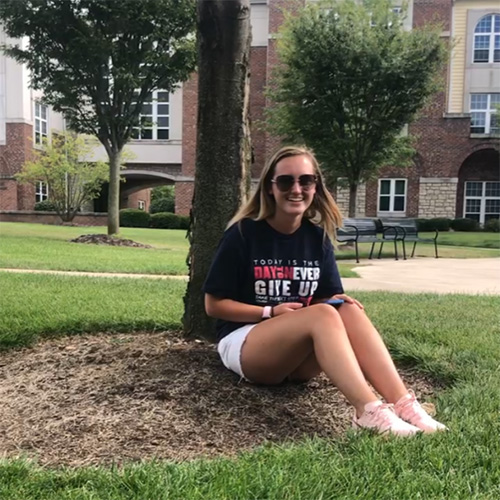Visibility for disability
On Friday, Oct. 23, Brianna Gavin is wearing blue to draw attention to what goes unseen.
 Gavin, a senior psychology major who’s served as chair of the Student Government Association Mental Health Committee since 2018, helped organize UD’s recognition of Invisible Disabilities Week, which is dedicated to the promotion and education of physical and mental illnesses one may not see. Examples of invisible disabilities can include depression, bipolar disorder, anxiety, chronic pain, diabetes, endometriosis and lupus.
Gavin, a senior psychology major who’s served as chair of the Student Government Association Mental Health Committee since 2018, helped organize UD’s recognition of Invisible Disabilities Week, which is dedicated to the promotion and education of physical and mental illnesses one may not see. Examples of invisible disabilities can include depression, bipolar disorder, anxiety, chronic pain, diabetes, endometriosis and lupus.
Gavin has been actively involved in mental health initiatives on campus since coming to UD in 2017 and serves as co-president of UD’s chapter of Active Minds, a national organization supporting mental health awareness and education for students. In 2019, with the help of Counseling Center psychology resident Flora Igah, the SGA Mental Health Committee advocated to Gov. Mike DeWine for a proclamation of the third week in October to be deemed “Invisible Disabilities Week” in the state of Ohio.
“This was important for me because of how many people I know who have invisible disabilities and how I have overcome my own personal struggles with invisible disabilities,” Gavin said. “Knowing that rejection and disbelief is on its way when I may receive an accommodation for my struggles is disheartening. Fellow students and friends who struggle with their own invisible disabilities have expressed their own discontentment with others’ understanding of their illnesses.”
Gavin said she’s been pleased with the UD community’s work to accommodate students with unseen illnesses and wants to continue that level of awareness and education. The Student Government Association is inviting the campus community to wear blue on Friday and post their “blue” on social media with the hashtag #InvisibleDisabilitiesWeek.
“It’s important for me to use my voice to advocate for others when they may be unable to do so.”
“It’s important for me to use my voice to advocate for others when they may be unable to do so,” Gavin said. “I can use my positions on campus to amplify the unheard voices and encourage others to use theirs to do the same.”